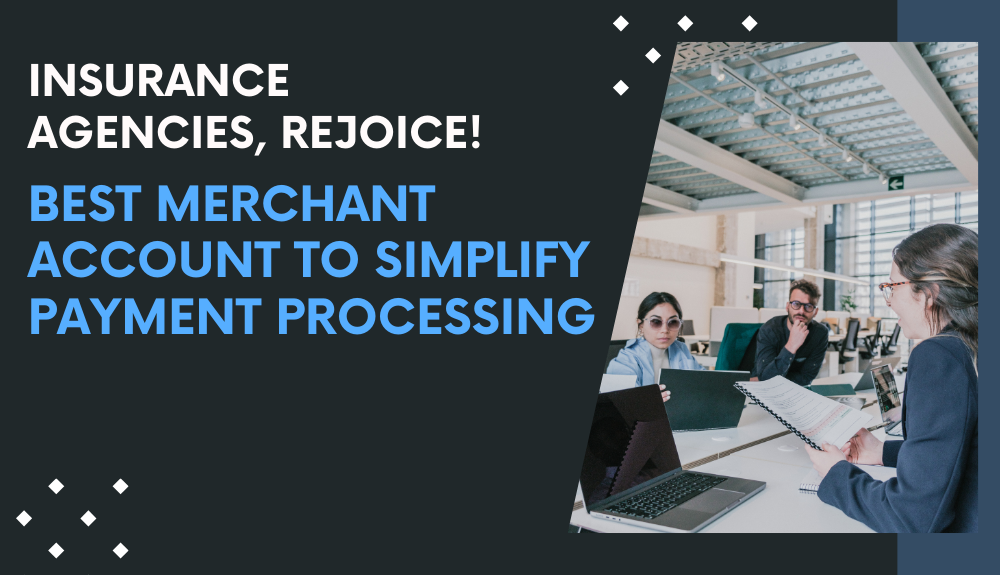Insurance Agencies, Rejoice! Find the Best Merchant Account to Simplify Payment Processing

A Beginner’s Guide to High Risk Merchant Accounts: Everything You Need to Know
December 16, 2023
Supercharge Your Online Invoicing: Expert Tips for Choosing the Best Merchant Account
December 19, 2023Are you an insurance agency struggling with payment processing? Look no further! In this blog, we will discuss the best merchant account services that can simplify your payment processes and streamline your operations. Say goodbye to manual transactions and hello to efficiency.
In this blog, we will address the pain points faced by insurance agencies when it comes to payment processing. Whether it’s handling credit card payments, recurring billing, or ensuring PCI compliance, we’ve got you covered. We will dive deep into the world of merchant accounts, exploring the features, benefits, and considerations you need to take into account before making a decision.
1. What is a Merchant Account?
Have you ever wondered how businesses are able to accept credit card payments? It all starts with a merchant account. A merchant account is a type of bank account that allows businesses to accept and process credit card payments from their customers. It acts as an intermediary between the business and the payment processor, ensuring that transactions are securely and efficiently processed.
Setting up a merchant account is essential for insurance agencies, or any type of business that wants to streamline their payment processing. It provides a secure foundation for accepting credit card payments, while also offering a range of features and benefits that can simplify your financial operations.
Here are some key points to understand about merchant accounts:
1. Functionality: Merchant accounts enable businesses to accept a variety of payment methods, including credit cards, debit cards, and even mobile payments. This flexibility allows insurance agencies to cater to their customers’ preferences and provide a seamless payment experience.
2. Security: Merchant accounts prioritize the security of transactions. They employ various encryption protocols and fraud detection measures to protect sensitive customer data and minimize the risk of fraudulent activity. This instills trust in your customers and protects both their information and your business reputation.
3. Payment Processing: With a merchant account, insurance agencies can process payments quickly and efficiently. The account facilitates the transfer of funds from the customer’s account to your business account, ensuring a smooth transaction flow.
4. Reporting and Analytics: Merchant accounts often come with reporting and analytics tools that provide valuable insights into your business’s financial performance. These tools allow you to monitor sales, track trends, and identify areas for improvement, helping you make data-driven decisions to grow your agency.
5. Customer Service: Many merchant account providers offer dedicated customer support to assist with any issues or questions you may have. This ensures that you have access to professional assistance whenever you need it, giving you peace of mind and saving you time.
💡 key Takeaway: A merchant account is a vital tool for insurance agencies, simplifying payment processing and providing a secure and efficient way to accept credit card payments. It offers functionality, security, payment processing capabilities, reporting tools, and reliable customer service.
2. How Insurance Agencies Benefit from Merchant Accounts
Insurance agencies, just like any other business, can greatly benefit from having a merchant account. These specialized accounts provide a streamlined payment processing system that can simplify and enhance the overall financial operations of insurance agencies. Let’s explore some of the key benefits that insurance agencies can enjoy by integrating a merchant account into their payment processing infrastructure.
Increased Payment Options for Clients
One of the main advantages of having a merchant account for insurance agencies is the ability to offer a wide range of payment options to clients. Traditional payment methods such as checks and cash can be time-consuming and inconvenient for both the agency and the clients. By accepting credit and debit card payments through a merchant account, insurance agencies can provide their clients with a more convenient and modern way to settle their premiums or make insurance-related transactions.
Enhanced Financial Efficiency
Managing payments and tracking financial transactions can be a complex task for insurance agencies. However, with a merchant account, this process becomes much more streamlined and efficient. Merchant accounts integrate seamlessly with agency management software, allowing for automatic and real-time updates of financial data. This automation reduces the need for manual data entry, minimizes human error, and saves agency staff valuable time. Additionally, merchant accounts provide detailed reporting features that offer insights into revenue streams, transaction history, and customer payment trends, allowing agencies to make data-driven decisions.
Secure Payment Processing
Data security is a paramount concern for insurance agencies. Merchant accounts offer robust security measures to safeguard sensitive payment information. They employ encryption technology and comply with Payment Card Industry Data Security Standards (PCI DSS) to ensure that financial data remains protected throughout the entire transaction process. By implementing a merchant account, insurance agencies can provide their clients with peace of mind, knowing that their personal and financial information is secure.
Improved Cash Flow and Revenue Streamlining
Timely and efficient payment processing is crucial for maintaining a healthy cash flow within insurance agencies. Late or delayed payments can have a significant impact on financial stability. Merchant accounts expedite payment processing, allowing insurance agencies to receive funds quickly and automatically. This improves cash flow management and reduces the risk of delayed or missed payments. Furthermore, merchant accounts provide options for recurring billing, enabling insurance agencies to set up automated premium payments, ensuring a steady revenue stream.
Flexible Payment Plans
Insurance agencies often need flexibility when it comes to premium payments. Merchant accounts offer the capability to set up recurring billing cycles that align with the individual needs of clients.
3. Understanding Payment Processing for Insurance Agencies
Payment processing is a critical aspect of running any business, and insurance agencies are no exception. In order to simplify the payment collection process and ensure smooth financial transactions, it is important for insurance agencies to have a thorough understanding of payment processing systems and choose the best merchant account for their specific needs. Let’s delve into the key factors that insurance agencies should consider when it comes to payment processing.
1. Importance of Secure Transactions
Insurance agencies deal with sensitive customer information, including personal and financial details. Therefore, it is crucial to prioritize security when selecting a payment processing solution. Look for merchant accounts that offer robust security features such as encryption, tokenization, and fraud detection tools to safeguard customer data and protect against potential cyber threats.
2. Integration with Insurance Software
Insurance agencies rely on specialized software to manage their operations effectively. When choosing a payment processing solution, it is important to ensure compatibility and seamless integration with your existing insurance software. This will streamline your workflow, minimize manual data entry, and eliminate the need for double data entry, saving you time and reducing the chances of errors.
3. Accepting Different Payment Methods
Insurance agencies should aim to provide customers with convenient and flexible payment options. Whether it’s credit card payments, online banking transfers, or digital wallets, offering multiple payment methods enhances the overall customer experience and increases the likelihood of timely payments. When evaluating merchant accounts, consider their ability to support various payment methods that are popular among your target audience.
4. Competitive Pricing
As with any business expense, cost is an important consideration. Compare the pricing structures and transaction fees offered by different merchant account providers. Pay careful attention to any hidden costs or additional charges associated with payment processing. Look for a solution that offers competitive rates without compromising on the quality of service provided.
5. Customer Support and Service Reliability
In the fast-paced insurance industry, downtime is not an option. Make sure you choose a merchant account provider that offers reliable customer support and technical assistance. Prompt and efficient support is vital to address any issues or concerns that may arise during payment processing. This ensures minimal disruption to your operations and maintains customer satisfaction.
💡 key Takeaway: Insurance agencies should prioritize secure transactions, seek integration with their insurance software, offer various payment methods, consider competitive pricing, and choose a provider with reliable customer support when selecting a payment processing solution.
4. Factors to Consider When Choosing a Merchant Account
When it comes to managing payments for your insurance agency, choosing the right merchant account is crucial. It not only simplifies payment processing but also ensures a smooth and secure transaction experience for both you and your clients. To make an informed decision, here are four important factors to consider:
1. Payment Processing Fees:
Compare the rates and fees offered by different merchant account providers. Look for transparent pricing models with no hidden charges.
Consider the overall cost of accepting payments, including interchange fees, transaction fees, monthly fees, and any additional fees for value-added services.
2. Security and Fraud Prevention:
Ensure the merchant account provider adheres to strict security standards, such as PCI DSS compliance, to protect sensitive payment data.
Look for features like tokenization and encryption to safeguard customers’ payment information.
Check if the provider offers fraud detection and prevention measures, like address verification service (AVS) and CVV verification.
3. Integration Capabilities:
Evaluate the compatibility of the merchant account with your existing software systems, such as your insurance agency management software or CRM.
Consider whether the merchant account can seamlessly integrate with your preferred payment gateway, allowing for convenient payment processing.
4. Customer Support and Service:
Assess the quality and availability of customer support provided by the merchant account provider.
Look for a provider that offers dedicated account managers, 24/7 support, and multiple channels of communication (phone, email, live chat).
Read reviews or seek recommendations from other insurance agencies to gauge the provider’s reputation for responsiveness and reliable service.
By carefully considering these factors, you can choose a merchant account that aligns with your insurance agency’s needs, budget, and technology infrastructure.
💡 key Takeaway: When choosing a merchant account for your insurance agency, consider factors such as payment processing fees, security measures, integration capabilities, and customer support to ensure a smooth and hassle-free payment experience for you and your clients.
5. Simplifying Payment Processing with a Merchant Account
In today’s digital age, insurance agencies have increasingly turned to online platforms to streamline their operations. An essential aspect of this digital transformation is finding the best merchant account to simplify payment processing. With the right merchant account, insurance agencies can optimize their financial transactions, enhance customer experience, and improve overall efficiency.
1. What is a merchant account?
A merchant account is a type of bank account that allows businesses to accept payments from customers through various channels, including credit cards, debit cards, and online payment platforms.
It serves as an intermediary between the insurance agency and the customer’s payment method, securely processing and verifying the transaction.
2. Benefits of using a merchant account for insurance agencies:
a. Accepting multiple payment methods: A merchant account enables insurance agencies to accept a wide range of payment options, such as credit and debit cards, e-wallets, and mobile payments. Offering diverse payment methods improves convenience for customers, potentially attracting more business.
b. Streamlined payment processes: By integrating a merchant account into their payment system, insurance agencies can automate payment processes, reducing manual tasks and administrative burden. This automation allows for faster, more efficient transactions, benefiting both the agency and the customer.
c. Enhanced security: Merchant accounts offer robust security measures, including encryption and fraud detection, minimizing the risk of payment-related issues such as fraud or data breaches. Insurance agencies can prioritize the safety of sensitive customer information, building trust and credibility.
d. Improved cash flow management: With a merchant account, insurance agencies can receive payments quickly and efficiently. Timely payment processing facilitates better cash flow management, ensuring that funds are readily available for the agency’s operational needs.
e. Access to analytics and reporting: Many merchant account providers offer reporting and analytics tools that provide valuable insights into payment trends, customer behaviors, and transaction histories. Harnessing this data can help insurance agencies make informed business decisions and optimize their strategies.
By leveraging a merchant account, insurance agencies can revolutionize their payment processing, saving time, effort, and resources. However, it is crucial to carefully select a merchant account provider that aligns with the specific needs and goals of the agency.
6. Enhancing Security with a Merchant Account

In the digital age, security is of utmost importance, especially when it comes to processing online payments. Insurance agencies understand the need to protect sensitive customer information and transactions. That’s where a reliable merchant account can make all the difference.
1. Streamlined Payment Process
With a merchant account tailored for insurance agencies, you can streamline your payment process and provide a secure platform for your customers. By integrating with your website or mobile app, a merchant account enables your customers to make payments conveniently and securely.
2. PCI Compliance
One of the key advantages of having a merchant account is the assurance of Payment Card Industry Data Security Standard (PCI DSS) compliance. Meeting the stringent security requirements set by PCI DSS helps insurance agencies avoid potential breaches and fraudulent activities. This ensures that your customers’ payment information is encrypted and protected every step of the way.
3. Fraud Prevention Measures
Merchant accounts often come equipped with robust fraud prevention measures. These measures help detect and prevent fraudulent transactions, safeguarding both your insurance agency and your customers. Features like real-time risk assessment, address verification, and tokenization add an extra layer of security, minimizing the risk of chargebacks and unauthorized use of credit card information.
4. Reliable Payment Gateway
A merchant account provides access to a reliable payment gateway that securely transmits transaction data between your customers’ devices and your insurance agency’s bank account. This ensures that sensitive information is encrypted during transmission, further enhancing the security of online payments.
5. Secure Data Storage
Insurance agencies deal with a significant amount of customer data, including payment information. A merchant account offers secure data storage options, ensuring that payment information is encrypted and stored in compliance with industry standards. This minimizes the risk of data breaches and strengthens customer trust in your agency’s commitment to their security.
💡 key Takeaway: A merchant account is a valuable tool for insurance agencies to enhance payment security, streamline the payment process, and protect customer data. It provides PCI compliance, fraud prevention measures, a reliable payment gateway, and secure data storage options. By prioritizing security with a merchant account, insurance agencies can build trust and provide a seamless payment experience for their customers.
7. Optimizing Payment Processes for Insurance Agencies
Insurance agencies often deal with a high volume of payment transactions, making it crucial to optimize their payment processes for efficiency and convenience. By streamlining payment processing, insurance agencies can enhance customer experience, improve cash flow, and reduce administrative burdens. In this section, we will explore the key strategies for optimizing payment processes within the insurance industry.
1. Choose a Reliable Merchant Account Provider
A merchant account acts as a bridge between insurance agencies and payment processors, enabling secure and seamless transactions. When selecting a merchant account provider, insurance agencies should prioritize reliability, security, and affordability. Consider these factors while making your decision:
Reputation: Opt for a provider with a solid reputation in the industry, known for providing excellent customer service and efficient payment processing solutions.
Security Measures: Ensure your merchant account provider adheres to industry-standard security protocols such as PCI DSS compliance to safeguard sensitive customer data.
Integration: Verify that the merchant account provider integrates smoothly with your existing insurance agency management software for seamless payment processing.
2. Implement EMV Chip Technology
The introduction of EMV (Europay, Mastercard, and Visa) chip technology has significantly enhanced payment security, reducing the risk of fraudulent transactions in the insurance industry. By enabling EMV chip acceptance for in-person payments, insurance agencies can protect themselves and their customers from potential liability associated with card-present fraud. Additionally, EMV technology provides peace of mind by adding an extra layer of security.
3. Offer Online Payment Options
In today’s digital age, customers expect convenience and flexibility when it comes to paying for insurance services. Insurance agencies should consider offering online payment options to cater to customers’ preferences. By integrating a secure online payment gateway into their website or mobile app, insurance agencies can enable customers to pay premiums and file claims conveniently from any device.
4. Automate Recurring Payments
For agencies dealing with recurring premium payments, automating the collection process can save time and minimize the risk of late or missed payments. Implement a recurring payment system that automatically charges customers’ preferred payment methods at regular intervals. This simplifies the billing process and improves customer retention.
“Implementing a reliable merchant account provider and embracing advanced payment technologies like EMV chip acceptance can enhance insurance agencies’ payment processes and improve customer satisfaction.”
💡 key Takeaway: By optimizing payment processes through reliable merchant accounts, EMV chip technology, online payment options, and automated recurring payments, insurance agencies can streamline transactions, improve customer experience, and drive business.
8. Key Considerations for Insurance Agencies Implementing a Merchant Account
In today’s digital age, insurance agencies are increasingly relying on merchant accounts to simplify payment processing. However, selecting the right merchant account for your agency requires careful consideration. By keeping the following key considerations in mind, insurance agencies can make informed decisions and streamline their payment systems.
1. Industry-specific features
Insurance agencies have unique needs when it comes to payment processing. Look for a merchant account provider that offers industry-specific features tailored to the insurance sector. This may include integrations with insurance management systems, the ability to process recurring payments for policy premiums, and support for multiple payment methods such as credit cards and electronic checks. By choosing a merchant account with these features, you can ensure seamless payment processing that aligns with your agency’s operations.
2. Security and compliance
Insurance agencies handle sensitive customer information, making data security a top priority. Ensure that the merchant account provider you choose complies with industry standards for data security, such as Payment Card Industry Data Security Standard (PCI DSS) compliance. Look for features like tokenization and encryption to protect sensitive payment data from breaches. Additionally, verify that the provider has robust fraud detection and prevention measures in place to safeguard your agency and your customers.
3. Integration capabilities
Efficiency is key for insurance agencies, so it’s vital to select a merchant account that integrates seamlessly with your existing systems. Consider whether the provider offers integration options with your insurance management software, accounting systems, and customer relationship management (CRM) platforms. Streamlining the payment process through integrations can save time and reduce manual data entry, enabling your agency to focus on providing exceptional service to clients.
4. Pricing and transparency
Merchant account providers have different fee structures, so it’s essential to understand the pricing model and ensure transparency. Evaluate the fees associated with setting up the account, transaction processing fees, monthly statements, and any additional costs. Seek providers that offer clear pricing breakdowns and provide transparent information about their fee structures. Taking the time to compare different providers and understand potential fees can help you make an informed decision and avoid unexpected costs down the line.
9. Comparison of Fees and Pricing Structures for Merchant Accounts
When choosing a merchant account for your insurance agency, it’s essential to consider the various fees and pricing structures offered by different providers. Understanding these costs will help you make an informed decision and ensure you’re getting the best value for your money. In this section, we’ll delve into the key factors to consider when comparing fees and pricing structures for merchant accounts.
1. Transaction Fees:
Transaction fees are the charges applied to each payment processed through your merchant account. These fees can vary significantly between providers. Some may offer a flat transaction fee for all transactions, while others may charge a percentage of the transaction amount. It’s crucial to evaluate how transaction fees will impact your overall payment processing costs.
2. Monthly Fees:
Many merchant account providers charge a monthly fee to maintain your account. This fee may cover services such as account management, customer support, and security features. Compare the monthly fees among different providers and consider whether the services they offer justify the cost.
3. Interchange Fees:
Interchange fees are charges imposed by credit card networks, like Visa and Mastercard, for processing transactions. These fees are non-negotiable and typically comprise a percentage of the transaction value. However, some merchant account providers may add an additional markup called the “discount rate” on top of the interchange fees. Understanding how these fees are structured will help you assess the total cost of accepting credit card payments.
4. Chargeback Fees:
Chargebacks occur when a customer disputes a transaction and requests a refund. Merchant account providers often charge a fee for handling chargebacks, usually ranging from $20 to $50 per incident. Consider the chargeback fees of different providers, as they can significantly impact your profitability in case of frequent disputes.
5. Contracts and Early Termination Fees:
When signing up for a merchant account, it’s important to review the contract terms and conditions. Some providers may require you to commit to a long-term contract, typically ranging from one to three years. Additionally, be aware of any early termination fees that may apply if you decide to switch providers before the contract ends.
6. Additional Fees and Add-Ons:
Apart from the fees mentioned above, some providers may charge extra fees for additional services or features. These can include fees for equipment rental, PCI compliance, statement generation, or monthly minimum transaction requirements. Scrutinize the list of additional fees and add-ons to ensure you’re aware of all potential costs.
10. Tips for Insurance Agencies to Maximize Benefits with a Merchant Account
Insurance agencies play a crucial role in providing financial protection and peace of mind to individuals and businesses. However, managing payment processing efficiently is often a challenging task. That’s where a reliable merchant account can come to the rescue. To help insurance agencies leverage merchant accounts to their fullest potential, we’ve compiled a list of 10 valuable tips:
1. Understand Your Payment Needs:
Determine the types of payments you typically receive from clients.
Analyze the volume and frequency of transactions.
Consider whether you need to accept online payments or process in-person transactions.
2. Look for Industry-Specific Solutions:
Seek merchant account providers that specialize in serving insurance agencies.
Such providers often offer tailored features and integrations that streamline your payment processes.
3. Embrace Mobile Payment Solutions:
Mobile payment options enable insurance agents to accept payments on the go.
Choose a merchant account that offers mobile payment capabilities for enhanced convenience and flexibility.
4. Prioritize Security and Compliance:
Look for merchant accounts that prioritize data security and compliance.
Ensure the provider follows Payment Card Industry Data Security Standard (PCI DSS) guidelines to safeguard sensitive client information.
5. Optimize for Fast and Seamless Integration:
Choose a merchant account that integrates smoothly with your existing insurance agency systems.
Seamless integration ensures efficient payment processing without disruptions or complications.
6. Leverage Automated Billing and Invoicing:
Choose a merchant account that offers automated billing and invoicing features.
Automation reduces administrative overhead, minimizes errors, and improves cash flow.
7. Provide Multiple Payment Options:
Offer your clients a range of payment options, including credit cards, debit cards, and electronic fund transfers.
Catering to diverse customer preferences can boost customer satisfaction and accelerate payment collection.
8. Utilize Reporting and Analytics Tools:
Opt for a merchant account that provides robust reporting tools.
Use analytics and insights to track transaction trends, identify areas for improvement, and make informed business decisions.
9. Offer Subscription-Based Payment Plans:
If applicable to your insurance agency business model, consider offering subscription-based payment plans.
Such plans provide convenience for clients and dependable recurring revenue for your agency.
10. Provide Excellent Customer Support:
Choose a merchant account provider known for excellent customer support.
11. Future Trends in Merchant Accounts for Insurance Agencies
The world of merchant accounts is constantly evolving, and insurance agencies need to stay ahead of the game to simplify their payment processing. Here are some key future trends to keep an eye on:
1. Mobile Payments
Mobile payments have been on the rise in recent years, and this trend is only expected to continue for insurance agencies. With the increasing adoption of smartphones and the convenience they offer, more and more customers are opting to make payments through their mobile devices. Insurance agencies that offer seamless and secure mobile payment options will have a competitive edge in the market.
2. Contactless Payments
Contactless payments, enabled by technologies like Near Field Communication (NFC) and QR codes, are gaining popularity across various industries, including insurance. With contactless payment options, customers can simply tap or scan their devices to complete a transaction without the need for physical contact or inserting cards. Insurance agencies that embrace contactless payments will be able to provide a faster and more convenient payment experience, enhancing customer satisfaction.
3. Integrated Payment Solutions
As technology advances, insurance agencies are increasingly looking for integrated payment solutions that seamlessly connect with their existing systems. Integrated payment solutions enable agencies to consolidate their payment processing operations, save time, and streamline their workflows. By integrating payment solutions with their CRM systems or agency management software, insurance agencies can improve efficiency and provide a better customer experience.
4. Enhanced Security Measures
With the increasing threat of cybercrime, insurance agencies need to prioritize security when it comes to payment processing. Future trends in merchant accounts for insurance agencies will focus heavily on incorporating enhanced security measures such as tokenization, encryption, and multi-factor authentication. These measures will help protect sensitive customer information and build trust with clients.
5. Data Analytics and Reporting
A merchant account that offers robust data analytics and reporting capabilities can provide valuable insights for insurance agencies. By analyzing payment data, agencies can gain a deeper understanding of customer behavior, identify trends, and make informed business decisions. Data-driven insights can help insurance agencies optimize their payment processing strategies, identify areas for improvement, and ultimately increase revenue.
💡 key Takeaway: To keep up with the evolving landscape of payment processing, insurance agencies should embrace trends such as mobile payments, contactless payments, integrated payment solutions, enhanced security measures, and data analytics.
12. Choosing the Right Merchant Account for Your Insurance Agency

When it comes to payment processing for your insurance agency, selecting the right merchant account is crucial. A merchant account acts as a gateway that enables your agency to accept credit card and electronic payments from your clients. This section will guide you through important considerations and steps you should take to choose the best merchant account for your insurance agency.
1. Assess Your Payment Processing Needs:
Before diving into the search for a merchant account, it’s essential to assess your agency’s specific payment processing requirements. Consider factors such as the types of insurance products you offer, the volume of transactions you anticipate, and the payment methods your clients prefer. By understanding your unique needs, you can narrow down your options and ensure your merchant account aligns with your agency’s goals.
2. Research Industry-Specific Merchant Account Providers:
Insurance agencies have unique payment processing needs compared to other businesses. It’s crucial to partner with a merchant account provider that understands the intricacies of the insurance industry. Look for providers who specialize in serving insurance agencies, as they will have tailored solutions and experience in handling the specific challenges of insurance payments.
3. Evaluate Security Features:
Insurance agencies handle sensitive client information and financial transactions daily. Therefore, security should be one of your top priorities when selecting a merchant account. Look for providers that offer robust security features such as encryption, tokenization, and fraud detection tools. These features ensure that your clients’ data is protected and minimize the risk of financial fraud or data breaches.
4. Consider Integration with Insurance Management Systems:
To streamline your payment processing workflows, consider merchant accounts that seamlessly integrate with your insurance management systems. Integration can automate payment reconciliations, reduce manual data entry, and enhance efficiency by eliminating the need for duplicate data entry. Look for providers that offer integration options with popular insurance management software to ensure a seamless experience for your agency.
5. Examine Fees and Pricing Structures:
Merchant account providers charge various fees, including transaction fees, monthly fees, and termination fees. It’s crucial to carefully review their pricing structures to understand the total cost of processing payments. Compare fees across different providers and consider the value they offer in terms of security features, customer support, and additional services.
6. Check Customer Support Availability:
In the event of any technical issues or questions, having access to reliable customer support is vital. Ensure that the merchant account provider offers responsive customer support and multiple support channels.
Conclusion
In conclusion, finding the best merchant account for your insurance agency can greatly simplify payment processing and enhance the overall efficiency of your operations. By carefully considering your specific needs and conducting thorough research, you can select a merchant account provider that offers the right features and benefits for your agency. Firstly, assess your payment processing needs and determine the key features you require. This could include options for accepting credit cards, online payments, recurring billing, and integration with your existing software systems. Once you have a clear understanding of your requirements, compare different merchant account providers to find the one that best aligns with your needs. Secondly, consider the fees and pricing structures offered by different providers.




